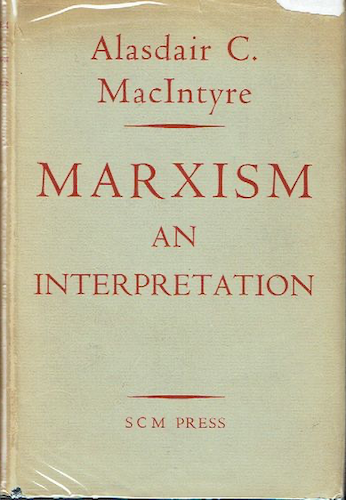“When the sacred and the secular are divided, then religion becomes one more department of human life, one activity among others. . . . This has in fact happened to bourgeois religion. . . . Only a religion which is a way of living in every sphere either deserves to or can hope to survive. For the task of religion is to help see the secular as the sacred, the world as under God. When the sacred and the secular are separated, then ritual becomes an end not to the hallowing of the world, but in itself. Likewise if our religion is fundamentally irrelevant to our politics, then we are recognizing the political as a realm outside the reign of God. To divide the sacred from the secular is to recognize God’s action only within the narrowest of limits. A religion which recognizes such a division, as does our own, is one on the point of dying.”
—from Alasdair MacIntyre, Marxism: An Interpretation (London: SCM Press, 1953)
Related reading and listening
- A life well lived — In this essay, Stanley Hauerwas explains the breadth and depth of Alasdair MacIntyre’s thought, the goal of which was to help people to act intelligibly and live morally worthy lives. (40 minutes)
- The roots of “the indignant self-righteousness of protest” in modern politics — Alasdair MacIntyre on why unmasking nefarious motives became “one of the most characteristically modern of activities”
- How the Enlightenment blinded us — Alasdair MacIntyre on the dependence of rationality on a lived tradition
- It takes a character (and a village) — Herbert McCabe, O.P. on the Aristotelian, Thomistic, and MacIntyrean account of the moral life
- An impoverished anthropology — FROM VOL. 146 Mark Mitchell asks whether there is anything that truly binds Americans together beyond their commitment to self-creation. (34 minutes)
- Insisting that political leaders are incapable of obeying Christ — Oliver O’Donovan on the unintended consequences of the First Amendment to the U.S. Constitution.
- The historian’s communal role as storyteller — FROM VOL. 127 Historian Christopher Shannon discusses how American academic historical writing presents a grand narrative of progressivism, which it defends by subscribing to an orthodoxy of objective Reason. (21 minutes)
- Once there was no “secular” — Carlos Eire on the metaphysical assumptions championed in the sixteenth century
- The loss of awe, the idolatry of partial thinking — Thaddeus J. Kozinski on reading modernity’s symptoms wisely (and wonder-fully)
- Questioning the “sacred-secular” division — With the stage set by Michael Sandel, Jean Bethke Elshtain, David L. Schindler, and John Milbank, Andrew Willard Jones examines a medieval alternative to the modern liberal paradigm. (61 minutes)
- The inevitability of escalating public animosity — With excerpts from books and lectures by Alasdair MacIntyre, Oliver O’Donovan, and Wendell Berry, Ken Myers argues that modern political theory has guaranteed increasing levels of public conflict. (19 minutes)
- How science became the omnipotent arbiter of genuine knowledge — Peter Harrison on the creation of an allegedly neutral public sphere
- The religious character of medieval secular life — John Milbank on the sacred canopy of premodern Europe
- The problem with patriotism in secular democracies — Alasdair MacIntyre on the systematic rejection of the tradition of the virtues in modern political institutions
- Principles have to be discovered, not chosen — Alasdair MacIntyre on the problem of natural law and contemporary culture
- Roger Kimball: “Josef Pieper: Leisure and Its Discontents” — Roger Kimball introduces listeners to Josef Pieper’s arguments about the nature of leisure, which are claims about the nature of philosophy and of human well-being. (34 minutes)
- Why Johnny can’t think coherently — Alasdair MacIntyre on the importance of theology in liberal arts education
- Free trade zone for preferences — Philip Turner examines “the subversion of Christian belief and practice by the logic of autonomous individualism”
